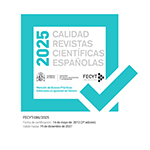(D)escribir la China en la experiencia misionera de la segunda mitad del siglo XVI: el laboratorio ibérico
Resumen
El objetivo de este artículo es el de proponer una reflexión acerca de la especificidad de la escritura misionera como proceso de producción de saber. Sin dar como adquirido el “carácter proto-etnográfico de la escritura misionera”, en contra de la lectura tradicional que se nos ofrece desde Claude Levi- Strauss, trata de poner en perspectiva las condiciones geopolíticas y aquellos elementos susceptibles de conformar una episteme propia, por medio de los cuales, en la segunda mitad del siglo XVI, la China se convirtió en objeto de saber para el mundo letrado europeo, inscrito en un nuevo marco global. Para ello, se sirve de la lectura conjunta de tres textos que –es la hipótesis del artículo– constituyen la base de una operación historiográfica de esta naturaleza: el Tratado das Cousas da China de Gaspar da Cruz, la Historia de las cosas las mas notables, ritos y costumbres del gran reyno de la China de González de Mendoza, el De Christiana Expeditione apud China de Nicolas Trigault.Descargas
Descarga artículo
Licencia
La revista Cuadernos de Historia Moderna, para fomentar el intercambio global del conocimiento, facilita el acceso sin restricciones a sus contenidos desde el momento de su publicación en la presente edición electrónica, y por eso es una revista de acceso abierto. Los originales publicados en esta revista son propiedad de la Universidad Complutense de Madrid y es obligatorio citar su procedencia en cualquier reproducción total o parcial. Todos los contenidos se distribuyen bajo una licencia de uso y distribución Creative Commons Reconocimiento 4.0 (CC BY 4.0). Esta circunstancia ha de hacerse constar expresamente de esta forma cuando sea necesario. Puede consultar la versión informativa y el texto legal de la licencia.












